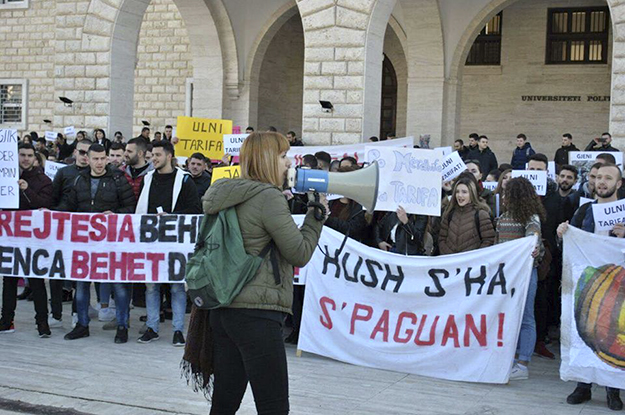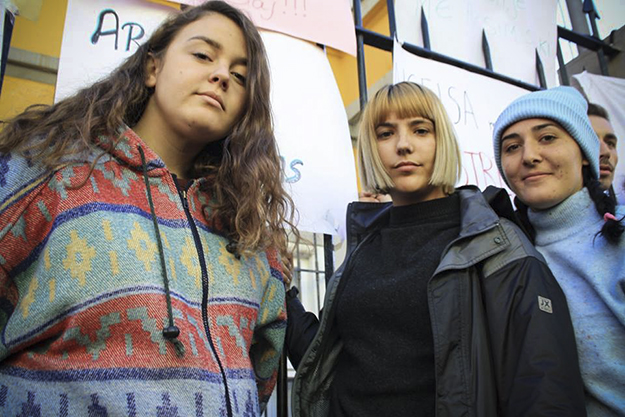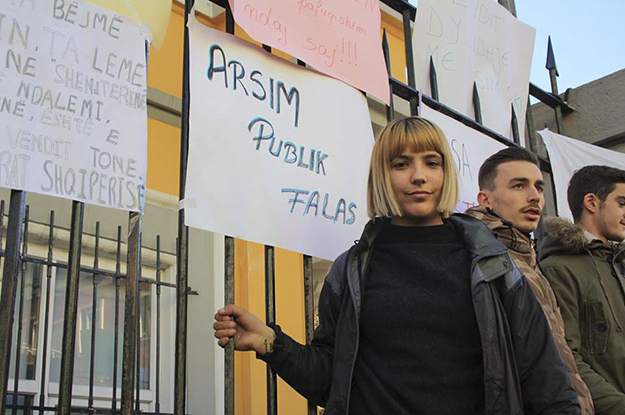The culmination of an eventful year seems to be the month of December in Albania, in which students of public universities have risen in revolt demanding the abolition of the Law on Higher Education, the reduction of university tariffs and an increase of the state budget, as non negotiable conditions towards a qualitative public education which is accessible for all. From December 5, hundreds of students took to the capital streets, quickly increasing in number and expanding the protests to other cities in Albania.
However, the history of the student revolt which has recently gained momentum started four years ago when a group of students of the University of Tirana initiated systematic organizations to take over the breaks of their university. At the vanguard of the civil attempts for social justice is Albina Ruko, a student of the Faculty of Social Sciences at the University of Prishtina, and an activist for Lëvizja Për Universitetin (Movement for the University). She says that she chose not only to make no compromise for freedom and fundamental human rights, but also to fight in the name of those who can’t.
In an interview with K2.0, Ruko spoke about the student revolt for free public education and the solidarity between them to hold the government accountable.

Photo courtesy of Ivana Dervishi.
K2.0: In the last four years, students have protested for free and qualitative public education in Albania. However, only in the last couple of weeks have the protests gained immediate momentum, perhaps exceeding the expectations of many, as thousands of students in the biggest cities in the country have boycotted lectures and taken to the streets to protest. What caused this reaction?
Albina Ruko: The reaction came as a result of the Decision of the Ministers’ Council [DMC] number 288, which was issued on May 21, 2018: “For the approval of the maximal margin of the annual tariff for tuition for students who are educated in public institutions of higher education, in a program of the first cycle of study, in an integrated program of study or in a program of professional study, in full time”.
Specifically point four of DMC, which foresees the submission of the tariff for tuition for credit for obligations or retaken classes, and the annual tariff for tuition. The shift of the payment deadline from January to December in the Faculty of Engineering caused discontent and revolt among students. The economic situation in Albania is dire. When we speak about poverty, we must take into account destitution, the fact that Albanian families and youth are not able to provide for themselves, let alone to afford educational ransom.
Moreover, many students are forced to work low-paying jobs to provide for themselves and their families, and consequently they are forced take some of their semester exams in Autumn or the following year because they are unable to attend classes regularly or prepare for them properly. There are also those who strive for high grades and want to retake classes when they are not content with their grades in the first exam. These are all inherent reasons. Thus, students felt extorted once again by the additional tariff for exams, and they felt ridiculed by the arrogant decision to shift the payment deadline.
"It gave us hope when we saw the mobilization of thousands of students, who took to the streets to demand their rights."
The reality is more complicated than one may think, and it is definitely not as simple and banal as is claimed by prime minister [Edi] Rama, who offends students instead of listening to them, calling them “failures” and other degrading labels that he chooses to use when describing them. However, as you say, it’s been four years since the start of the protests for abolishing fines for students and for reducing university tariffs to implement free public education – like in 17 European Union states.
Albania has the highest tariffs in the region. Masters studies reach figures of 2,000 euros, whereas the average wage in the country is 250-300 euros. It seems that the students have had enough, and this pressure which has come in the form of tariffs against students was enough to incite them to protest and solidarize to finally hold the government responsible. It gave us hope when we saw the mobilization of thousands of students, who took to the streets to demand their rights, overcoming fear to articulate their rights. The main issue for materializing their rights remains the abolition of the Law for Higher Education.
You are among the most active voices in the protests. In fact, for the most part you’ve positioned yourself at the head of the protests, leading the students through calls and speeches. What does all this mean to you?
The reality is harsher for women than it is for men. Many of them are unable to attend university as a result of the economic situation. Conditioned by absurd income which is insufficient to fulfill basic needs, many of them are forced to work hard labour in insecure conditions and for low pay, or they are forced to marry as a form of “salvation”, when in fact this comprises another form of slavery, and a shift from the pressure and patriarchal violence, which is exercised by their fathers, to the one exercised by their husbands.
"We are determined to take this to the end, and to simultaneously give a good lecture about democracy and citizenship to the leaders of this country."
The pressure that our society puts on women was enough to incite me to protest. This insecurity and other issues of an economic and social nature affect me and many of my peers. This made me realize that I can obtain freedom and independence only by raising my voice for the rights that belong to me, often in the name of those who are unable to raise theirs; by organizing with others and pushing this perverse government until it has its back to the wall.
I speak in the name of all women, of all students who are unable to join us, who are unable to attend university, to show them that only together can we make it. My voice speaks for the women who are denied the most basic opportunities and freedoms.
On October 22, in a meeting which Edi Rama held in Hotel Tirana International to speak with students about the issue of the scholarship of excellence and public university tariffs, you responded by choosing to face the prime minister. However, he refused the discussion, and chose to offend you instead, after which you were forcibly removed from the hall by his guards. Did you expect this?
I did. Violence is the only language that our prime minister knows. When a few years ago students demanded to be heard and to discuss the reform for higher education, they were ignored, offended, and afterwards punished with violence. This was proven quite clearly especially when eight of the women who were protesting for the education cause were sentenced to two months imprisonment just because they dared to exercise their constitutional right to protest.
Today, the prime minister is [playing the victim] by saying that students “are losing their chance” to speak with him, whereas he has made this communication impossible. However, his gangster-like behavior and attitude does not scare me or my friends. We are determined to take this to the end, and to simultaneously give a good lecture about democracy and citizenship to the leaders of this country who have failed in all levels of political power. They have failed society.
In the last few days we witnessed incidents during the student protests. Exponents of political parties exercised violence against some students and activists of Lëvizja Për Universitetin. However, the situation was taken under the control of the students who showed that they are determined to protect the protest and their cause. Is this kind of risk common during symbolic actions and protests? After all, massive rallies have always been unpredictable.
Massiveness comes with unpredictability, but I would say that protests and politics in itself are more challenging than dangerous. Without a doubt, political parties and their exponents, these old wolves who have extorted and exercised violence, are always ready to pounce at the mass to disrupt it for their interests, which are not aligned with the interests of citizens.

Photo courtesy of Ivana Dervishi.
On the other hand, today we live in the age of internet and social media. It wasn’t hard to identify party militants who came to the protests. The independent mass of students responded especially when Jani Marka, a pedagogue at the Faculty of Natural Sciences and an activist of Lëvizja Për Universitetin, was prevented from speaking by a group of militants who sought to usurp freedom of speech during the protest. There were such incidents, but they were managed with calmness and carefulness.
Students realized that none of the parties are their allies, so they chose to respond against them. One of the strongest echo of the protest was the call “Parties out!”, because students demand self-determination, to decide for themselves. We will make the university and society ourselves!
How do you see the participation of pedagogues in the protests? Do they support the students?
Some pedagogues not only support us but have been some of the most active people who have strived to take the demands of students forward. They have been by our side from the beginning. Others have joined along the way. The ones who have not responded or have opposed students are mainly pedagogues who have been caught in the web of corruption or other illegal activities in the university, or are closely-aligned to the power structures.
However, recently the protests were so strong that they forced some to resign or to attempt to “disappear” for a while from public life. I remember the case with one pedagogue of the Faculty of Architecture, who was forced to resign after students publicly recalled each time he was bribed or demanded sexual favors. This happened in a meeting which was held between pedagogues and students of the faculty. This happened a few days ago and incited many reactions.
What’s next for the protests?
Students have finally overcome fear. They are no longer afraid to oppose pedagogues in faculties, or even the prime minister himself. Students are no longer afraid to boycott the imposed discussions with Rama, and not only that, they have ambushed him outside of the university and sought accountability for the money that has been extorted from them; for the unjustified wealth of the prime minister and other government officials; pressuring him to annul the Law on Higher Education and fulfill our demands.
"Organize together, raise your voice and demand change yourself. Do not expect it from others!"
We are witnessing this spirit in all cities in which students have risen in protest, not only in Tirana. In these conditions, with this determination and energy that has preserved the protest, prime minister Rama would do well to retreat as soon as possible and to fulfill our demands; otherwise, the whole country will be paralyzed, not only university life, until we get what belongs to us.
You study Sociology in the Faculty of Social Sciences at the University of Tirana. Why did you choose this major?
Sociology studies society in general. When you are raised in difficult conditions, you seek to understand why this happens; you make comparisons, you continuously ask questions, and you open the door for critical thinking. You need to understand yourself and the society you comprise. I think sociology as a field of knowledge gives us the opportunity to answer these questions. That’s why I believed that I need to research this field of knowledge, to break some barriers that have been built through the years. I feel good for this choice that I made.
How did you start your political activism?
We live in a society in which oppression is systemic. Violence is exercised against you every day in all spaces. Continuous problems at home, at school, at work etc. make you ask questions and reflect on them. This reflection is translated into an active denial of this reality,a sort of resistance which is accompanied by a strong reaction.
Soon you realize that you’re not alone, that there are many like you. There are young people – but also older people – whose right to education, to work, to housing, are all denied; there are workers who are exploited in dreadful working conditions, who often lose their life and end up as a mere figure in media; there are government officials who have expensive cars and clothes who ridicule us, demean us and oppress us like we are nothing. How can all this not open your eyes and awaken the revolt inside you? The society which I am a part of is far from being a just and democratic society. I refuse to live in such a society, thus I’ve decided to change it.
Beyond the student resistance, protests and social and political engagement, what else do you fill your day with?
I start my day early at the doors of the faculties in which women are exploited. Together with other activists, we hold meetings with students and workers, we speak to them, we try to understand the root of the problems that affect us the same albeit in different ways, and we strive to find a common solution.

Photo courtesy of Ivana Dervishi.
I spend a good part of my day at Logu i Shkëndijës, the social center in which we hold literary discussions, political and philosophical debates, where we organize for our protests, read poetry, laugh and cry with each other, where we grow as people every day by learning from one another.
What is your call for the youth who read this Q&A?
My call is for all friends, colleagues, students and whoever else reads this: never let anyone mistreat you, not at school, not at work, and definitely not in higher levels of power. React against sexist, scornful calls, against oppression. Don’t let them steal your right to speak. Organize together, raise your voice and demand change yourself. Do not expect it from others. Only this way will the world be made more whole.
This conversation was edited for length and clarity. The interview was conducted in Albanian.




